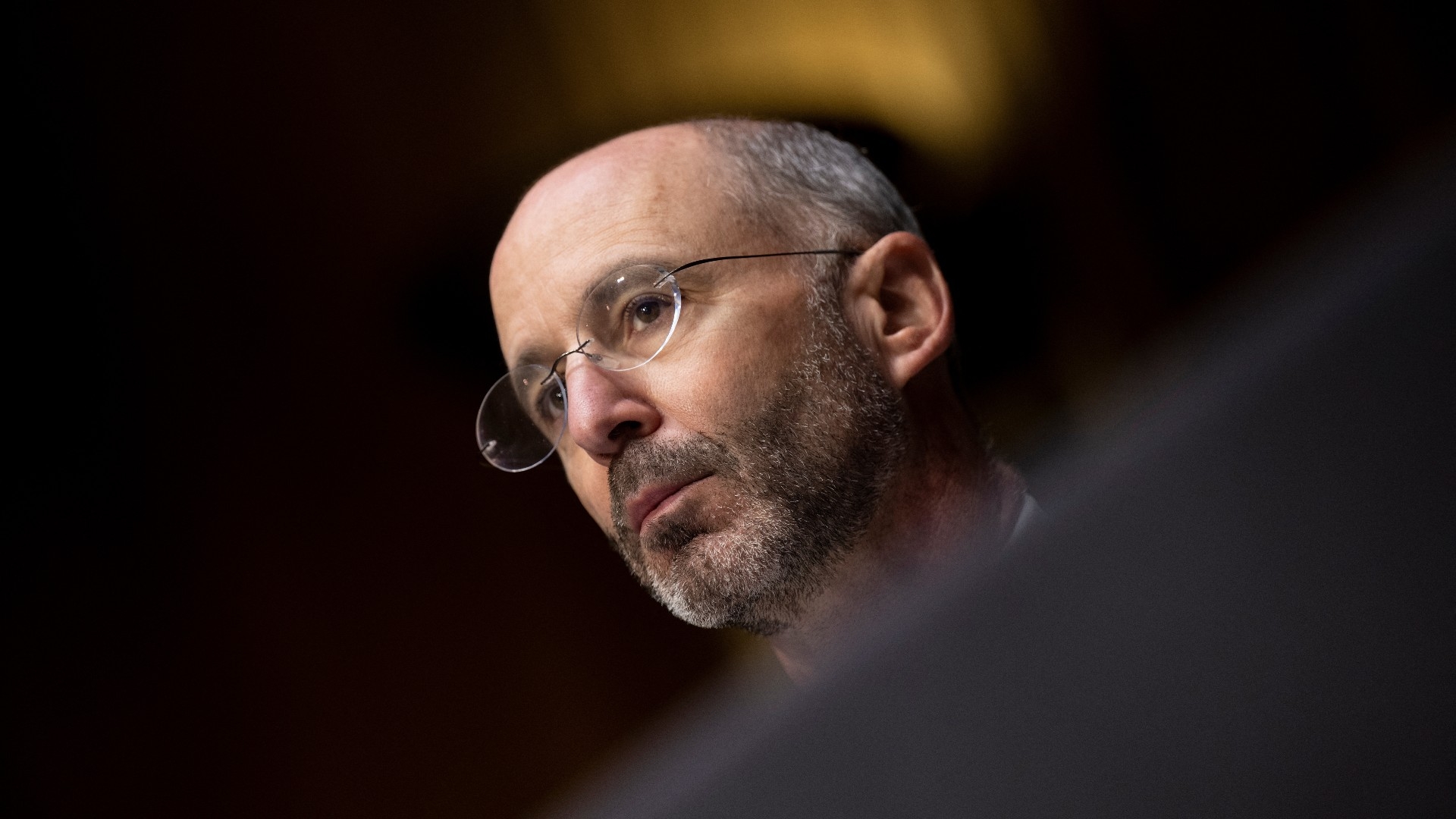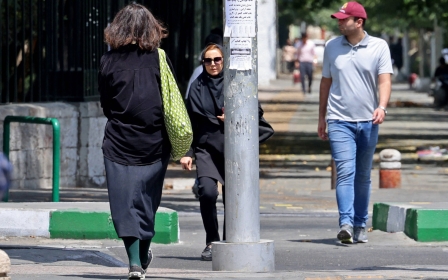Iran nuclear deal opponents conspired to oust US special envoy Robert Malley

Hardliners in Iran opposed to a return of the 2015 nuclear deal cooperated with individuals in the United States to oust the US special envoy for Iran, Robert Malley, sources with direct knowledge of the matter have told Middle East Eye.
Malley was leading the Biden administration's efforts to revive the faltering deal before he was put on administrative leave in late June.
The former Obama-era official had helped craft the 2015 accord and, earlier in his career, was involved in former President Bill Clinton's failed effort to broker peace between the Israelis and Palestinians.
However, on 29 June, after being inactive in his role for weeks, Malley was placed on unpaid leave.
He had told colleagues he was taking extended personal leave for unspecified family reasons, but his security clearance was suspended at some point earlier this year.
Efforts to revive the Iran nuclear deal, which has been moribund since Washington withdrew under President Donald Trump in 2018, began showing promise in September, when the US engaged with Iran in an attempt to ease tensions.
Those discussions were aimed at outlining steps to limit Iran's nuclear programme, secure the release of detained US citizens in the Islamic Republic, and unfreeze some Iranian assets abroad.
'The situation surrounding Malley is unprecedented, with influential anti-deal hardliners in Tehran collaborating with anti-deal circles in the US'
- MEE source in Tehran
However, just when it was reported that Iran and the US were nearing a temporary deal that would swap some sanctions relief for Iran reducing its uranium enrichment activities, Malley disappeared.
Sources in Tehran told Middle East Eye that Malley's dismissal had pleased both hardliners in Tehran and individuals in the United States opposed to a return to the accord.
A source in Tehran told MEE that "certain hardline and influential elements within Tehran and out of government, without President Ebrahim Raisi's consent and awareness, had cooperated with anti-deal circles in [Washington] DC to fabricate information about Malley".
The source did not elaborate on the fabricated information, but referenced a report in the pro-government Tehran Times newspaper which claimed that Malley had mishandled classified documents, saying it was part of a larger plan or puzzle.
"The situation surrounding Malley is unprecedented, with influential anti-deal hardliners in Tehran collaborating with anti-deal circles in the US," the source said. "Their intention appears to be preventing any potential deal between Tehran and Washington from materialising.
"This is not the first time that during Raisi's tenure, hardliners in Iran have sought to sabotage the deal," the source added. "There have been previous instances where the anti-deal hardliners in Tehran have hampered progress and a deal."
The source added that the Iranian government is now aware of the elements in Tehran seeking to obstruct a deal.
Another senior Iranian source said Iranian hardliners initiated the contact with the anti-deal Americans.
'Improper' contacts
The 10 July report by the Tehran Times claimed Malley had "improper" contact with various circles and individuals, including Iranians involved in Washington's diplomacy towards Iran.
According to the newspaper, as part of his mission, Malley was in regular contact with Iranian diplomatic brokers and pundits who often appeared in Iran's media.
While Malley sought to advance his policies in Iran, these individuals had their own agenda, the newspaper alleged. Reportedly, their "footprint in recent years can be clearly seen in Washington's diplomacy towards Tehran".
The newspaper also suggested that Malley "did not adhere to protective principles in his dealings with these individuals and raised some points that he was not authorised to discuss".
In another report on 16 July, the Tehran Times claimed again that: "The main problem of Malley stems from his secret talks with Iranian Ambassador to the UN Saeid Iravani and his meetings with some of the Iranian-American figures in the US."
These claims were later echoed on 26 July by The Washington Free Beacon, a right-wing American outlet deeply opposed to the nuclear deal, which also suggested that Malley mishandled classified information.
"If Malley misplaced a document or failed to secure a piece of information, the State Department's diplomatic security section could revoke his clearance pending an investigation, according to current and former government officials," it wrote.
The Washington Free Beacon cited sources claiming that Malley might have leaked classified information to a network of supposedly pro-Tehran advocates who supported the Obama administration's Iran deal.
According to the outlet, these advocates were briefed regularly by Malley and other stakeholders involved in the original Iran deal, to reinforce the administration's talking points.
Reports in US media have since claimed that the FBI is investigating the Biden administration's Iran point man, while the State Department has scrubbed Malley's picture and biography from its website.
MEE contacted the State Department for comment but did not receive a response by time of publication.
Republican role?
An informed senior source in Tehran, one familiar with the Iran-US talks, said Malley had "stated that his suspension is a result of efforts by certain Republicans.
"Malley has told Iranian Ambassador Saeid Iravani that his suspension was not a serious matter and that he would return soon," said the source.
'The new allegation that Malley had no authorisation to talk to Iravani is absurd'
– MEE source in Tehran
"The new allegation that Malley had no authorisation to talk to Iravani is absurd, as both the top officials in Iran and the US were fully aware of the talks, and had given authorisation to their representatives to sit and talk with each other."
Republican members of Congress have repeatedly taken aim at Malley's efforts to revive the deal, with some accusing the 59-year-old of holding "radical" sympathies with the Iranian government and enmity towards Israel.
Last month, US House Foreign Affairs Committee Chair and vocal Republican Mike McCaul alluded to the possibility that Malley may have committed treason if he provided state secrets to a US adversary.
"There's no proof of that, but if he did, that would be treason in my view," McCaul said of Malley.
Regardless of the causes for Malley's sidelining, opponents of the nuclear deal in Iran have welcomed the decision.
Iran's official news agency, IRNA - run by people close to the influential anti-deal hardliner Saeed Jalili - said Malley's dismissal was "meaningful" and coincided with the resolution of certain issues between Iran and the International Atomic Energy Agency.
The IRNA added that Malley's removal could be indicative of the US government taking measures to limit the activities of certain figures to reach deals with Tehran.
This article is available in French on Middle East Eye French edition.
Middle East Eye propose une couverture et une analyse indépendantes et incomparables du Moyen-Orient, de l’Afrique du Nord et d’autres régions du monde. Pour en savoir plus sur la reprise de ce contenu et les frais qui s’appliquent, veuillez remplir ce formulaire [en anglais]. Pour en savoir plus sur MEE, cliquez ici [en anglais].





